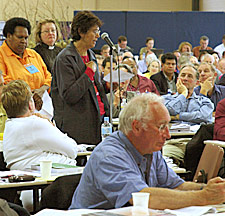
Last month the Board of Electors of the Primate met and after three ballots chose the Archbishop of Brisbane, Dr Phillip Aspinall to be Primate of the Anglican Church of Australia.
Dr Aspinall was elected Archbishop of Brisbane in 2001, having been Assistant Bishop in Adelaide from 1998. Previously he was Director of Anglicare Tasmania, and he also has extensive ministry experience in youth work and Christian education. He has an MBA from Deakin and a PhD from Monash.
Phillip Aspinall is a man with an acute mind and a pleasing personal style. Since arriving in Brisbane he has been faced with a number of difficult matters that one could say he "inherited' with the Diocese, and he has dealt with them with firmness and due attention to legalities.
The Primate has an important representative role for the Church, both in this nation and in the worldwide Anglican Communion, even if this role is not stated in the Constitution. With the present slender fragility of relationships within the Communion, Anglicans must pray for Dr Aspinall especially as he participates in the international meetings. Our own Church is divided on many issues and we all look to him to represent fully the breadth of opinion in Australia, including the biblical views of evangelicals and other conservative Anglicans.
Sydney Anglicans would have been heartened to hear the Primate tell his initial media conference that his first priority would be to encourage the Church to engage seriously in mission in this nation. He said the Church had much to learn from the Diocese of Sydney on this.
The Board of Electors of the Primate is made up of every diocesan bishop, plus 12 lay people and 12 clergy elected by the General Synod.
Sydney was under-represented on the Board. We had our diocesan, but we had just two lay people from Sydney, Justice Peter Young and myself, and only one clergy voter, Bishop Glenn Davies. This was my second time as a Primatial elector. In 2000 we had five lay people from Sydney, but still only one clergyman.
We did not fare well in the 2004 General Synod elections, especially considering we send 24 per cent of the representatives.
Why is it that Sydney often doesn't do well in General Synod elections? We are determinedly Bible based in our opinions and arguments, and may that never change. But standing for clear biblical teaching shouldn't be done discourteously or arrogantly.
Sometimes the reason we might not be heard could be the offence of the gospel. Yet negativity and nit-picking arguments can also cause offence. It is always helpful to affirm the good as well as pointing out what is incorrect.
Some Sydney people have made a huge contribution to General Synod " consider, for example, Garth Blake and Philip Gerber on child protection; Archbishop Jensen and Glenn Davies on the General Synod Doctrine Commission; and Robert Forsyth, Robert Tong and Justice Young on the General Synod Standing Committee.
All our representatives should go looking for where they too can make a positive contribution.
Some may not realise that missing a Bible Study because one is not in sympathy with a particular presenter, or not turning up for church services, is noticed and remembered when voting comes along.
Poor pre-election strategy may also explain why Sydney did not fare so well.
In 2004 General Synod decided to elect a Primate whose term would finish at the next General Synod, presumably in 2007. This will allow the church to consider what is the appropriate model of the Primacy into the future. A full-time Primate? A fixed term Primate? If a full-time Primate, should he be detached from any diocesan responsibilities?
As a member of the Primacy sub-committee, I would be pleased to hear from anyone who wants their particular views represented.


























